By David Stock

If you’re an avid reader of Another Word, you may recall a blog post by Brad Hughes—the Director of the Writing Center and the Director of Writing Across the Curriculum at the University of Wisconsin-Madison— honoring Professor Joyce Steward, founding director of the UW-Madison Writing Center in 1969 (then called the Writing Laboratory). In this post, I’d like to continue that tradition by honoring one of Joyce Steward’s mentors and colleagues in the UW-Madison English department: Professor Ednah Shepard Thomas, a pioneering writing program administrator who helped develop and direct UW-Madison’s Freshman English program from 1947-1970 and who contributed to the development of the Writing Laboratory.
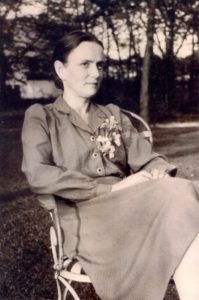
I first learned about “Mrs. Thomas,” as Steward and most everyone called her, when I was a PhD candidate in UW-Madison’s Composition & Rhetoric program. In 2010, Brad invited interested students to contact him about collaborating on the publication of a memoir by a former UW-Madison faculty member. At this point, I had conducted initial dissertation research on the history of rhetorical education at UW-Madison. After meeting with Brad to discuss the project, I was excited to learn more about that history from a primary, and previously unavailable, document.
And what a primary document it was: over 400 typed (i.e., on a typewriter) manuscript pages, a tome of personal and professional history that described Thomas’s early life and schooling in the New England area; her coursework and teaching in UW-Madison’s English PhD program; her marriage and child-rearing in nearby Monona, WI, followed by an unexpected divorce and the challenge of raising three young children alone; her fortuitous return to teaching at UW-Madison, successfully administering Freshman English, and eventually earning—at age 65!—the title of Full Professor.
A Collaborative Project
When I joined the project, Brad had already been collaborating with Professor Susan McLeod, a distinguished WAC scholar who met Mrs. Thomas while pursuing her PhD in UW-Madison’s English program, and Professor Mike Palmquist to publish the memoir as an open-access book through the WAC Clearinghouse. Over time, the scope of the project broadened to include the publication of additional relevant materials:
- a co-authored essay by Susan and Brad about both Mrs. Thomas’s and Joyce Steward’s pioneering contributions to writing program administration
- Mrs. Thomas’s influential booklet, Evaluating Student Themes, which provides guidelines for responding to student writing along with actual student writing
- an oral history interview with Joyce Steward, conducted by Brad just two years before Steward’s death, in which she describes the development and administration of the UW-Madison Writing Lab
These materials and Mrs. Thomas’s memoir, which includes a foreword by Susan McLeod and an afterword by Professor David Fleming, author of the award-winning book From Form to Meaning: Freshman Composition and the Long Sixties, 1957-1974, have been published in the WAC Clearinghouse’s Perspectives on Writing series under the title “Two WPA Pioneers: Ednah Shepard Thomas and Joyce Steward.” We hope that publishing these materials will provide greater understanding of the work of writing program administration in the field’s pre-professional era (i.e., prior to the formation of the Council of Writing Program Administrators in 1979) and greater appreciation for those who pioneered in such work. Further, we see Mrs. Thomas’s memoir functioning as a local history of writing program administration in the mid-twentieth century which includes a vital counternarrative to Fleming’s account of the abolition of UW-Madison’s Freshman English program in 1969-1970.
I want to highlight some of Mrs. Thomas’s accomplishments that demonstrate her unique preparation for and pioneering contributions to teaching and administering college writing in the mid-twentieth century.
Early Interest in Studying Writing
Mrs. Thomas graduated from Mt. Holyoke College in 1923 with a major in English composition (minor in English literature), which was intentional—she took all the composition courses she could. A primary reason she attended graduate school at Bryn Mawr was because the course catalog included a graduate course in creative writing. Unfortunately, the course was canceled due to low enrollment.
Atypical Interest in and Aptitude for Teaching Writing
When Mrs. Thomas enrolled in UW-Madison’s PhD program in English in 1925, her interest and talent in teaching English composition were recognized and rewarded with opportunities to teach additional sections in place of graduate work, which she gladly accepted. Although she excelled scholastically at Bryn Mawr and was the first student in the school’s history to earn the MA degree in one year, she had become somewhat disenchanted with the solitary pursuit of scholarship, whereas she genuinely enjoyed teaching writing.
Pioneering Contributions to Writing Program Administration
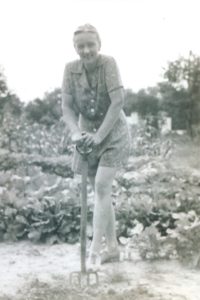
Prior to Mrs. Thomas’s invitation to assist with the administration of Freshman English in 1947, the job had required little more than scheduling teaching assistants. However, Mrs. Thomas assumed responsibilities that are commonly associated with WPA work: training and supervising teaching assistants, developing curriculum, coordinating student placement, planning and implementing assessment, as well as advising students. She also institutionalized the practice of assigning grades not to individual papers but on work accomplished at designated moments in the semester, which resembled an early version of portfolio grading. And she instituted a teaching assistant training program where experienced teaching assistants were assigned to mentor novice teaching assistants. As enrollments increased dramatically in the years following World War II, Mrs. Thomas fulfilled these and other responsibilities successfully, leading to a highly effective and surprisingly stable program for nearly 20 years.
Pioneering Contributions to Writing Instruction
As an articulation of her approach to training teaching assistants, Mrs. Thomas published a pamphlet on responding to and evaluating student writing. First published in 1955, Evaluating Student Themes went through four printings and became an all-time bestseller at the University of Wisconsin Press, in part because of its popularity among high school English teachers. In the booklet, Mrs. Thomas asserts that a teacher’s purpose is to show interest in and respect for students’ ideas, to balance encouragement with criticism, and to promote students’ life-long writing skills. (Sounds similar to writing center pedagogy, doesn’t it?) The booklet also models marginal and terminal (end) comments on actual student themes of varying quality. One of Mrs. Thomas’s purposes in her training was to help teaching assistants see what students were actually saying, rather than correcting or rewriting students’ papers based on what the teaching assistants wanted to see in students’ writing. The principles and practices in the booklet, when paired with regular instructor conferences, reflected an emphasis on the role of feedback and revision, rather than correction, in promoting the development of students’ writing ability.
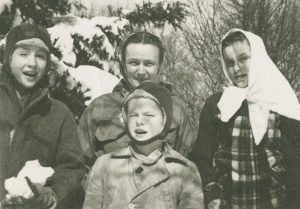
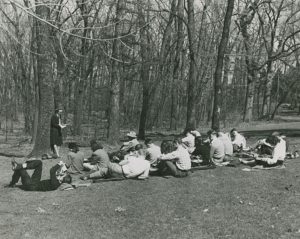
Influence and Involvement in the Writing Laboratory
In her oral history interview, Professor Joyce Steward recalled that Mrs. Thomas was involved in discussions with Freshman English faculty directors Edgar Lacy and William Lenehan about replacing Freshman English with a voluntary writing tutorial program. When Professor Steward was tasked with creating a writing lab, Mrs. Thomas accompanied her on visits to nearby writing centers, including the University of Iowa. Steward also acknowledged that Mrs. Thomas’s approach to writing instruction strongly influenced her (Steward’s) approach to training those who worked in the Writing Laboratory. And after her retirement, Mrs. Thomas volunteered in the Writing Lab on Tuesday mornings for several years, working with students on an individual basis as she had done with her students for so many years. While not the founder of the Writing Laboratory, Mrs. Thomas clearly influenced its development and its pedagogy.
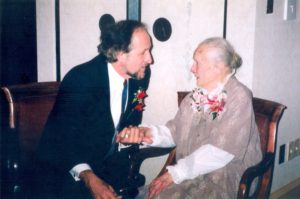
Publishing Mrs. Thomas’s memoir is an effort to memorialize the life and accomplishments of a remarkable individual whose professional contributions, when viewed alongside her personal life, are all the more admirable: overcoming a crippling divorce and raising three young children alone in the early 1940s is highly admirable; but returning to academia and flourishing as a writing instructor and writing program administrator while continuing to fulfill domestic obligations is truly remarkable. It is no wonder that, reflecting on her life, Mrs. Thomas claimed to have had “the best of both worlds. I am a full professor (emeritus) of the University of Wisconsin, and the only woman professor to have three children and seven grandchildren.” I’m certain that both titles—professor and mother—were deeply meaningful to her and that she would want to be remembered as both.
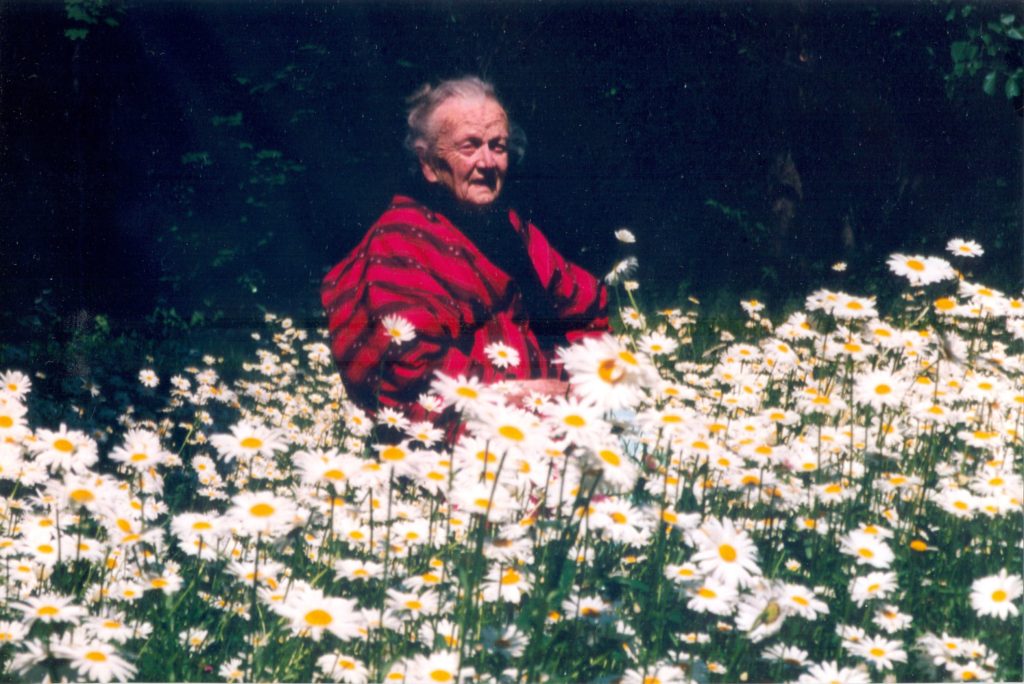
I hope you’ll check out Mrs. Thomas’s (and Joyce Steward’s) materials on the WAC Clearinghouse and leave a comment here about what you learned. Or post an observation or a question about Mrs. Thomas that came up as you read this blog post. I’d love to hear your impressions. Thanks for reading!
Featured photo at the top of this blog post: Ednah Shepard Thomas teaching outside, probably near Muir Woods. Courtesy of the University of Wisconsin-Madison Archives (ID S17533).

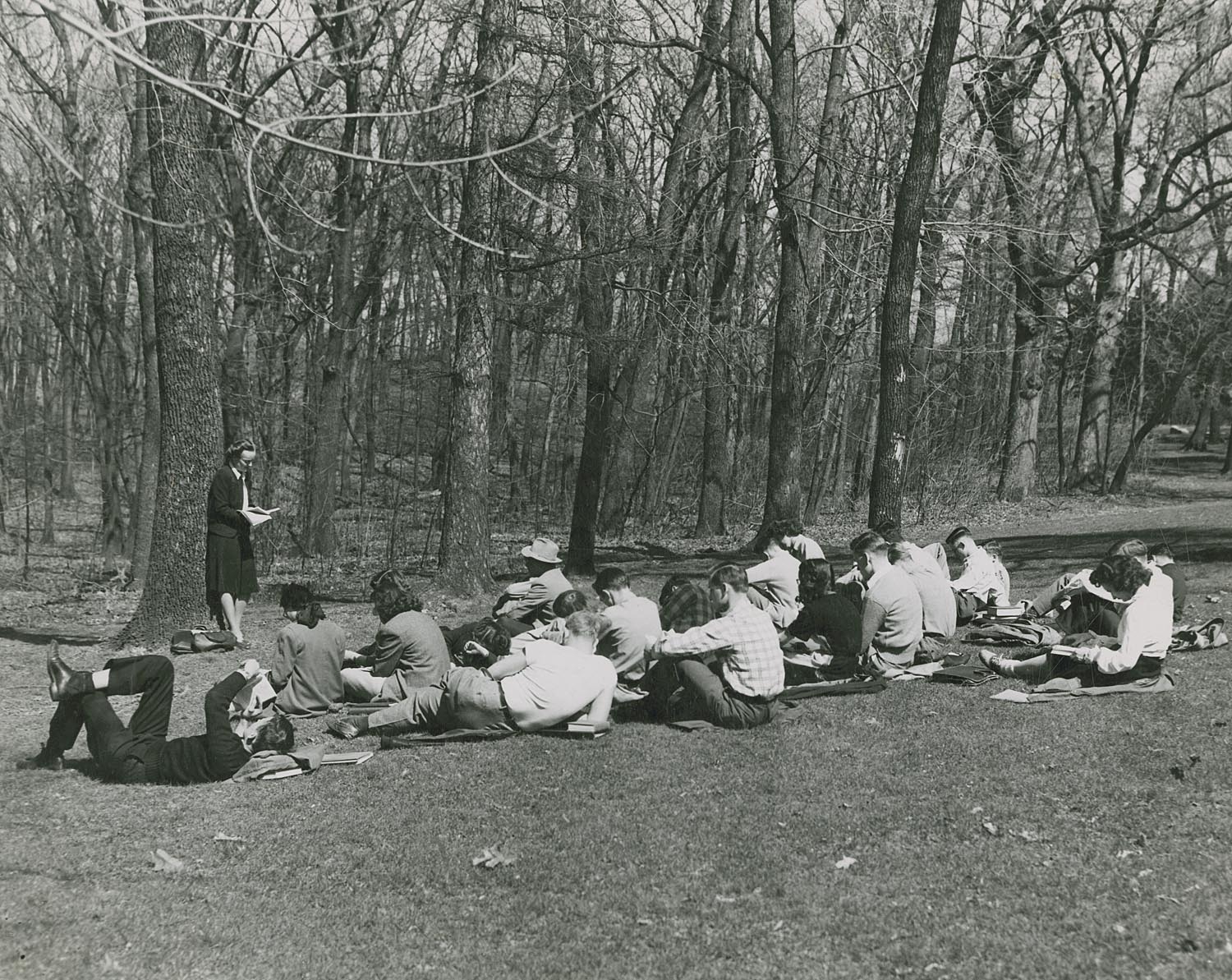
Dave, thank you for this post, which is truly inspiring, both in terms of the wonderful archival and other research represented by this project, and the life and work of Mrs. Thomas herself. It’s wonderful to learn more about UW-Madison’s institutional history and I am eager to read more of Mrs. Thomas’s work, but as an academic and a mother of four, I also deeply appreciate the biographical details that you highlight in this post.
Hi, Dave
What an entirely enjoyable post: thanks. I appreciate how your post and archival work add another meaningful layer to the history of WPA work, writing studies, and writing center work, and how your post provides this history in a show of respect and appreciation. One of the post’s highlights, that always bears repeating, is when you discuss her philosophy of teaching assistant training in offering feedback: “One of Mrs. Thomas’s purposes in her training was to help teaching assistants see what students were actually saying, rather than correcting or rewriting students’ papers based on what the teaching assistants wanted to see in students’ writing.” (I believe that this would be a great message for many university faculty to embrace more broadly.) See what students are actually saying. That she embraced this constructive philosophy at that time is a remarkable testament to the value of a positive approach in composition pedagogy. See what students are actually trying to say: then you will know what they think.
Christopher J. Syrnyk
Associate Professor, Communication
Director, Oregon Tech Honors Program
Thanks Dave for sharing this work and for helping to document the history of composition and rhetoric at UW-Madison. Many of our current students and alumni of the Comp-Rhet grad program are aware of the more recent distinguished faculty and achievements of the program but remembering these earlier figures helps us to chart a longer history and legacy of writing studies at UW-Madison which was an innovator in the early and mid 20th C.
Dave, There is no worse fate than to be standing on someone’s shoulder and not know it. So thank you and your colleagues for reminding us how great enterprises, like the teaching and learning of writing at the University of Wisconsin-Madison, are made out of the ancestral grit of people like Ednah Thomas. Let’s keep paying it forward. If we do it right, we too might find ourselves someday in a beautiful daisy patch.
A remarkable post, Dave, that speaks volumes both to the University of Wisconsin-Madison’s place in the history of writing studies as a field, and to the way a single individual can influence the shape of a discipline. Thank you for your dedication to the field, to the UW, and to understanding the lives, through deep history, of those who have affected both.
Very nice post, Dave. I really appreciate your efforts to bring Mrs. Thomas’s life and work to a new audience. She was a remarkable woman and deserves to be remembered. I know you spent a great deal of time in the University Archives working on Mrs. Thomas (and other projects) , and I think your work also helps show the types of materials that are often buried in archives and required dedicated work to unearth and elucidate.
Hi Dave. Wow. I truly had no idea who Mrs. Thomas was or all that she had accomplished. Nor did I know how much the groundwork she laid is the foundation of where I grew as a teacher and administrator. Thanks for sharing all this!
(Also–I LOVE that Daniel Travanti was a student in her first year class and came back to celebrate her so many years later!)
Dave,
What important work you, Brad, Sue, and others have done to preserve this history! Thank you, especially, for the extraordinary editorial labor you put into this project, including your exhaustive notes and insightful “Introduction” – an important piece of scholarship in its own right. And thank you (and Sue) for including me in the project. As I mention in the “Afterword,” I was thrilled to finally get a chance to read Ednah Thomas’ Memoir, which I had heard about for years but didn’t actually see until 2016.
I had at least three reactions to reading the manuscript: First, I wished I had seen it sooner! It would have been an invaluable resource for my book From Form to Meaning: Freshman Composition and the Long Sixties, 1957-1974: adding to and in some cases correcting my representation of key events in the story of Freshman English at the University of Wisconsin. One small example: in her Memoir, Thomas writes that she never referred to the graduate student instructors of Freshman English at UW as “Teaching Assistants,” the term I used throughout the book; she said she found it belittling and always called them “teachers” or “instructors” instead. It’s a small but telling detail. The Memoir does provide one important affirmation of my project: it confirms that something momentous happened in the teaching of composition in Madison during the 1960s. Thomas writes that the abolition of Freshman English at UW in 1969 was the single most important event of her professional career. And she states, in the final paragraph of the Memoir, that, although the last five years of her time at UW (1966-1971) were painful (she titles that chapter, simply, “Demolition”), they were “the most dramatic and exciting” of her life. Similarly, the charged feeling I had from studying that time and place – even from a distance of 40 years – has never left me.
Second, the Memoir provides a compelling portrait of a model Writing Program Administrator. Obviously, Ednah Thomas was a person of her times; we do many things, large and small, differently now. But she reveals in the book, I believe, what a writing program administered with the very highest standards looks like. I was especially struck by the combination of efficiency and humanity in her WPA work. “She was clearly,” I write, “a skillful manager: impressively detail-oriented, unfailingly reliable, extraordinarily hard-working, morally scrupulous. But she was also deeply human in her treatment of students and teachers alike.” I spend one whole paragraph in the “Afterword” just listing the social events she regularly hosted at her home, throughout the school year, for students, staff, and colleagues – literally, for decades. There were moments reading the Memoir when, as a WPA, I felt inadequate – but also inspired.
Finally, what most surprised me in reading Ednah Thomas’ Memoir was how interesting I found other parts of the book, parts completely unrelated to Freshman English at UW. I was especially taken by chapter six, when Thomas tells the story of her year teaching high school English in Danielson, Connecticut, in 1924-25, right after finishing her MA. “The chapter stands, in my opinion,” I write, “with the best examples of writing about teaching: Sylvia Ashton Warner’s Teacher, Mike Rose’s Lives on the Boundary, Tracy Kidder’s Among Schoolchildren. The vivid portrayal, never self-congratulatory – in fact, deeply and touchingly modest – of a young female teacher in a small working-class mill town in the 1920s, completely alone, out of her depth, searching for her own path in life, not only trying to figure out how to teach and what to teach but also becoming deeply, memorably, devoted to her students, is among the best and most inspiring stories of a young teacher in her first job that I have ever read.”
So, thank you Dave, Brad, Sue, and others for making this Memoir available to the whole world! If there’s a “Wisconsin Idea” in the teaching of writing, this is now one of its founding documents.
Thanks so much for this post, Dave — and thanks, too, to the broader team doing this important archival work fleshing out the history of our field even further. I’ve heard a bit about this project from Brad in the last few years, and I’m delighted to see it’s now available. In fact, these materials dovetail perfectly with the kinds of work I’ve been trying to expose graduate students to in a research methods course this spring. I can’t wait to bring this in to our discussions. I’m especially struck by the importance of charting writing program work in, as you said, in the field’s “pre-professional era.” I’ll certainly be heading over to the WAC Clearinghouse to learn more!
Dave, thanks for sharing your research on Professor Thomas! As someone who has recently entered a supervisory role of freshman writing at a small university, it’s interesting and encouraging to hear what kinds of new practices Prof. Thomas instituted that we now take for granted. And the 1940s with the GI bill would have especially been one of those times when people working in higher education worried about changes to traditionally prepared incoming students. I have a 95-year-old great uncle-in-law who loves to tell me (with a definite sense of admiration) about how his college English professor was appalled at GIs’ writing skills and so “whipped all of us soldiers into shape.” I appreciate how your history adds to my mental picture of what writing education has been like over the past century.
Thanks so much, Dave, for sharing your lovely and detailed introduction to the memoir and associated materials on the WAC Clearinghouse site. I’m facing a future as a WPA, and thinking a lot about the training and history of the UW program right now. It’s good to know where it came from, and, by extension, where all of us come from.
David Fleming’s observation above about the language shift from TAs to teachers is also an important addition to this conversation. I read David Fleming’s From Form to Meaning with great interest when it came out (and reviewed and interviewed him in 2012: http://enculturation.net/more-than-a-local-history), and this enriches the story.
Annette Vee, Assistant Prof of English, University of Pittsburgh